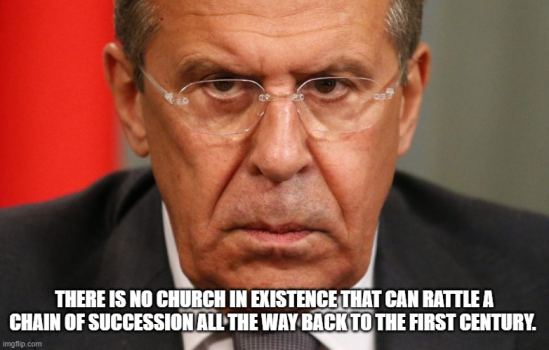I'd have to agree with
@Truther that organizations have failed.
Not sure why....in the CC I hear and would agree, that it's a great washing out of those that go
to church just for show, and the remnant will be left. Attendance is drastically low.
This is true also of Protestant denomnations.
However, the answer cannot be individual doctrine.....
Not absolutely sure what Truther believes, but if he believes we can each believe our own doctrine - made up by ourselves I guess - that will be the downfall of Christianity,,,which is already in trouble.
I do think the reformation was necessary....
but the result is horrendous.
The Principle of Authority in Religion
The question of spiritual authority plagues (or ought to plague) all religions. In the first place, the problem of authority causes intelligent observers to reject immediately the reliability of any religion which does not claim to be revealed by God. If we confine ourselves, then, to those religions which do claim to be revealed by God, we run into a second problem with authority. Even if the initiating Revelation is credible—that is, attested by signs and wonders that can come only from God—how do we know that the religion or church which claims to carry on this revelation can be trusted to elucidate and interpret it correctly over time?
The question of authority lies at the very core of religious belief because, first, we cannot know much about God and His Plan unless He reveals it and, second, we cannot intelligently accept as authentic any custodian of this Revelation unless it can establish its claim to preserve, explicate and interpret the Revelation without error over time. Yes, I know that many people are slipshod in their methods, accepting all sorts of alleged authority without raising intelligent questions. Nonetheless, when put to the test, the question of this authority is paramount.
This is so true that it would be ridiculous to suppose God would claim to complete a self-Revelation in history without finding a way to secure that Revelation against the ravages of human confusion over time. What, after all, would be the point?
Now:
It so happens that the Catholic Church is unique among all religions in that it contains within it what we call an “authority principle”. This principle guarantees the veracity of its teaching down through the ages, long after the original Revelation was received. This is so important that any serious reflection upon it enables us to understand immediately that the lack of such an authority principle, in any religion, is a very serious problem indeed.
As a matter of historical confirmation, we can see the difference between having an authority principle and not having one, even within Christianity, by comparing Catholicism to Protestantism. Even casual observers can see that Protestantism has, in its various forms, changed its teachings and beliefs in significant ways, quite literally hundreds of times if not thousands, with the necessary effect that the various sects disagree significantly with each other on even the most central points of faith and morals.
Clearly, this will not do.
The Catholic Authority Principle
The authority principle in Catholicism consists of Christ’s establishment of the Petrine authority, by which the successors of Peter confirm their brethren in the Faith until Christ comes again at the end of time. This principle is rooted in the prayer and promise of Christ, as preserved in Scripture (
e.g., Mt 16:18-19; Lk 22:31-32; Jn 21:15-17; Acts 15:7-12) and in Tradition, and as articulated and exercised consistently from the very first by the Church Christ established to bring His salvation to the ends of the earth. It is just this that is the unique claim of the Catholic Church.
When it comes to reliance on the authority principle, it is also vital that Catholics know exactly when it is in active operation, and when it is not. Catholics have always believed, and the Church has defined this clearly, that the vicars of Christ on earth speak infallibly, with the full authority of Christ, whenever they
(a) teach
(b) on a matter of faith or morals
(c) to the whole Church
(d) by virtue of their supreme Petrine authority.
This guarantee is sufficient to its purpose, which is to maintain integrity of Divine teaching within the Church until Christ’s return. Its essence is that
the Pope cannot bind the whole Church to error, and so Christ’s promise to be with the Church until the end of time cannot turn out to be a lie.
The teaching authority of the Pope, then, is guaranteed in its clear and specific operations,
by the same Holy Spirit who guarantees the veracity of Scripture itself. To effect its purpose—which is, obviously, to ensure that the Catholic Church remains essentially credible throughout history—it need not be any stronger or more complicated than it is, nor can it be any less.
Notice, then, that this authority principle instituted by Christ, and unique to Catholicism, has been Divinely established without any guarantee that popes will be good men, intelligent men, clear thinkers, or free from confusion, personal errors, and even sinful and scandalous behavior.
None of these inevitable human shortcomings affects the authority principle in the slightest. When any pope makes formally clear that he is deliberately “confirming the brethren” in their faith, the truth of his statement is kept free from error by God Himself. Nothing more, and nothing less, is guaranteed, or needs to be guaranteed, in a Church necessarily made up of sinners.
source



